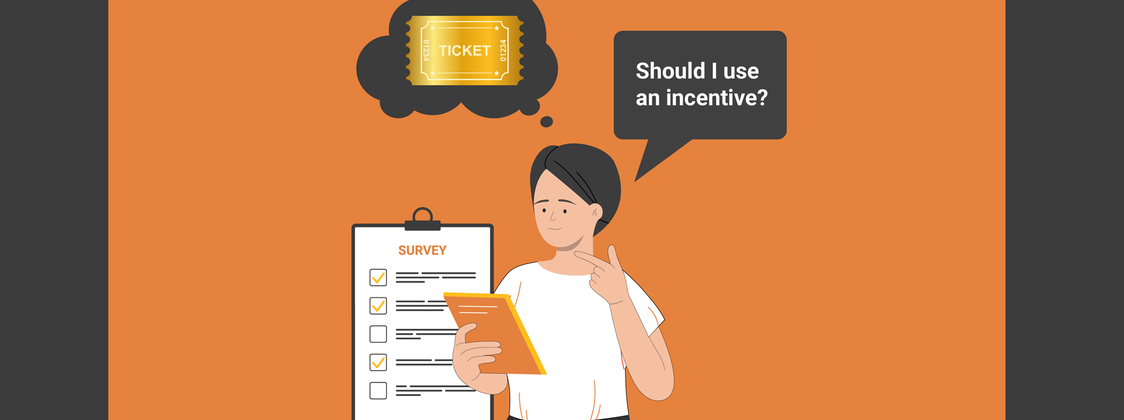Three Tips to Creating an Engaging Survey - that you might not have heard before
A great survey does more than collect valuable insights. But how do we keep people engaged?
Incentives can be seen as a golden ticket but should you use them?

Written by

Superpower: Overthinking
Fixation: Cookies and milk
Julie leads our social and market research service area, and her work also spans evaluation and monitoring, and organisational wellbeing. She is experienced in project management, evaluation and marketing.
She has previously worked in the arts and culture, tourism, health and sport and recreation sectors.
Julie holds a Bachelor in Commerce (International Business) from NEOMA Business School in France, an Honours Bachelor in Commerce (Global Management) from the University of Ottawa in Canada, and a Master of Tourism Management, First Class Honours, from Victoria University of Wellington in New Zealand. During her studies, Julie researched social marketing, attitudes and behaviour change.
Incentives are becoming more common in research – we know, we conduct hundreds of surveys and interviews per year. We also know that people’s time is valuable and that many industries are seeing ‘survey fatigue’.
When finding respondents becomes challenging, one solution is to offer an incentive. This might seem like the perfect golden ticket to fix your response rates, but should you be using them?
What form of incentive should you use, and how should you organise it?

Maximise participation and completion rates
Offering fair compensation for participants' time and expertise makes them more likely to participate and to complete the research (e.g., reach the end of the survey).

Capture hard-to-reach audiences
Recruiting participants who are not usually involved in research is made easier with an incentive, increasing research validity with a more representative sample.

Reduce spend on recruitment time
Making participation more appealing speeds up the research process which means that, overall, the cost of the incentive is often worth the investment.
When deciding whether using an incentive is right for your research, we suggest asking these key questions. A negative answer to any of them likely means an incentive is not recommended.
|
|
|
Yes |
No |
|
1 |
Do you have a sufficient budget for incentives? Cost varies depending on incentive type, but your budget needs to allow for it. By estimating what you might save on recruitment, you could reallocate some of your budget toward incentives. |
✓ |
❌ |
|
2 |
Have you followed best practices when designing your research? There are many things you can do that will improve response rate, reach and research validity that don’t include incentives. Without first following best practices, spending money on incentives might not provide the desired results. |
✓ |
❌ |
|
3 |
Is your research targeting a hard-to-reach audience and/or addressing a complex (or very dull) topic? If the topic is likely to generate strong interest, or the benefits of the research to the participant or wider society are obvious enough for participants to engage in the study, an incentive may not be needed. |
✓ |
❌ |
|
4 |
Are incentives ethically / culturally appropriate for your audience? When engaging with vulnerable participants, there are ethical considerations since an incentive could be perceived as coercion. In other cases, an incentive could be perceived as inappropriate (e.g., if individuals participate as representatives of an organisation where they are a member/employee) or culturally offensive. |
✓ |
❌ |
|
5 |
Could any resulting fraudulent behaviour, or poor / dishonest answers be mitigated? If you provide an incentive, you may find that you have some participants who lie about their eligibility and give either limited or dishonest responses to research questions. You can design mitigations for this (e.g., integrating a series of screening questions that assess topic-specific knowledge or behaviour, and/or post-hoc analysis). However, if you think mitigation might not be possible or effective, an incentive might not be worth the risk. |
✓ |
❌ |
If you are unsure about your answer to some of these questions, consider talking to researchers, ethics officers or committees, and/or individuals from the audience you are trying to reach, or who might work or live alongside them.
Let’s say you’ve answered ‘yes’ to all the questions above. Next, consider which incentive to offer. Each incentive type comes with its own set of advantages and disadvantages:
| Incentive type | Advantages | Disadvantages |
| Cash payments - or a bank transfer |
|
|
| Gift cards, coupons, discounts and giveaways - mail-in or online |
|
|
| Entry into a prize draw |
|
|
| Donation to a charity on behalf of the participant |
|
|
As you can see, there are many factors to consider. Scarlatti's social research team can help you to identify if an incentive is right for you, as well as how to ensure high research validity and integrity.
Julie Moularde, Scarlatti's social and market research lead, is ready to discuss your project and incentives.
Contact Julie Moularde now